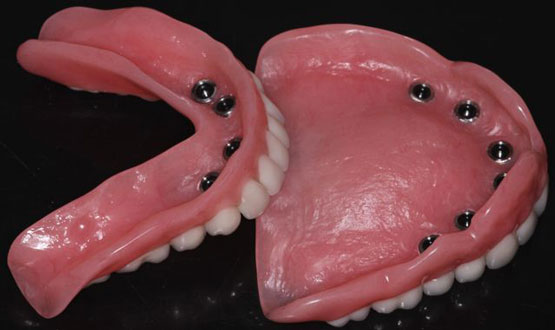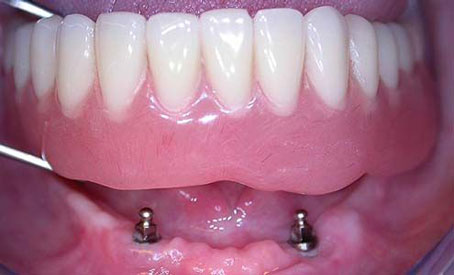Say goodbye to unstable dentures and improve your quality of life.
An implant-retained overdenture involves two or more implants along with a removable appliance. Dentists have said this is an upgrade from your typical denture.
These provide more support than traditional dentures. Also, implant-retained overdentures can improve your chewing better than a traditional denture.
You will need your dentist to reline this type of denture occasionally because, as your bone and tissues change over time, the fixture will need to be adjusted to fit. However, these are the most affordable option.
1Preserve Jaw Bone And Improve Appearance
One big reason denture implants are a great option is because they help you preserve your jaw bone and prevent further deterioration. This is not only healthy for your mouth, but it can improve your facial structure
If you’re missing multiple teeth or they’re not in good shape, there’s less in the jawbone that will stimulate bone growth. This is because your body can sense if your jawbone doesn’t need to support teeth any longer, so it will begin to pull tissues from the mouth to use elsewhere.
Missing even one tooth with no replacement can lead to deformed lips, chin, and wrinkly skin.
2Boost Self-Esteem And Confidence
Because you’ll look better and have a healthier jawbone and mouth, you’ll most likely feel better physically but also mentally. You’ll probably feel better about yourself and have much more self-confidence.
3Provide A Better Quality Of Life
Once you get replacement teeth, you’ll be more comfortable, confident, and have an overall better quality of life. With teeth, speaking is easier, smiling is a joy, and eating is no problem.
Denture implants are especially beneficial because you don’t have to deal with messy adhesives or ugly clasps. Denture implants help preserve your jaw bone and help your mouth look more natural, which leads to higher self-esteem, confidence, and an overall better quality of life.
A series of scans are taken by your dentist to aid in positioning the implant and to ensure you have plenty of healthy bone structure. If the bone is diseased or missing, there is still a possibility of a bone graft in order to make an implant viable.
Two or four titanium implants are surgically placed in the bone of your jaw. They are then left for between two and six months so the bone can grow around the implants. During this time, you may wear full upper lower dentures.
If more extensive treatment is needed, for example bone grafts or many implants, then the post-operative course may require more time and medication.
Anaesthesia during the surgery should make the placement procedure pain-free.
Whether or not the dental implant can be placed immediately after extraction depends on the amount of available bone in the area and presence or absence of active infection.
Placing the implant at the same visit helps preserve both width and height of bone and may prevent the need for placing bone grafts when bone naturally shrinks back after teeth are extracted.
During the first year after teeth have been removed, as much as 40% of jawbone width can be lost.
Sometimes, infection from a tooth or periodontal disease has destroyed the bone to such an extent that it becomes necessary to do a bone grafting procedure prior to implant placement.
If it is possible to place the implant at the same visit as the teeth are extracted, this can save at least three months in healing time compared to waiting for an extraction site to heal before the implants can be placed.
Once the implants are securely fused to the bone, small ball shaped extensions are placed over the implants and the dentures receive housings with rubber rings to hold on to the ball extensions. That is how dentures are secured to theimplants which you can remove easily to clean.
The only requirements to have a dental implant fitted is that you are in good health, possess a healthy jawbone and have no gum disease. The success rate of dental implants is very high.
A factor that can impact on the success of the procedure is the presence of gum disease or tooth decay. These need to be fully treated before even thinking about implants. Smoking needs to be stopped well before treatment and ideally after the implants are fitted. Smoking reduces healing capacity and can cause complications at the integration point of the implant, not to mention its other effects on general health.
Some medical conditions and the medication required to treat them can also have an adverse effect on implants. These include diabetes, cancer and gastric reflux.
It’s important to fully discuss your medical history with your dentist in the planning stages of the implant procedure.


One of the biggest advantages of dental implants is that they require no special after-care; simply brush, floss and visit your dentist as normal. Good oral hygiene, healthy gums and a twice yearly check-up are your implant’s best friends.
It’s important to fully discuss your medical history with your dentist in the planning stages of the implant procedure.
- No Gap (For Private Dental Health Insurance Patients)
- Not With Health Fund, Just pay $179
Shop 3, Ground Floor, 101-107 Oxford
street, Bondi Junction NSW 2022
Phone: 02 9387 3181
Fax: +61 93877570
Email: bondi@dentallifeline.com.au
178 Mann street Gosford 2250.
Phone: 02 4323 7007
Fax: +61 4323 7009
Email: gosford@dentallifeline.com.au
Shop 3/135 Pacific Highway Hornsby
Phone: 02 9476 0070
Email: hornsby@dentallifeline.com.au
106 Victoria Street, East Maitland.
Opening Soon…
Copyright © 2024 Dental Lifeline | All Rights Reserved.